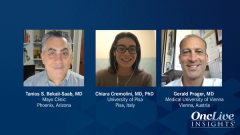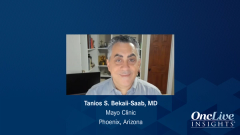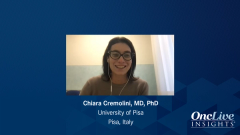
Management of Relapsed mCRC
Gerald Prager, MD, and Chiara Cremolini, MD, PhD, share their approach to managing the case of a 72-year-old man with mCRC disease progression and provide insight on rechallenging patients with anti-EGFR regimens.
Episodes in this series

Tanios S. Bekaii-Saab, MD: Moving on to the next case now, this is a 72-year-old man with unresectable adenocarcinoma of the descending colon, now found to be metastatic to the lungs and the lymph nodes. The disease was microsatellite stable, RAS wild type, BRAF wild type, HER2 nonamplified. He had a good performance status, and the patient was placed on FOLFOX [folinic acid, leucovorin, oxaliplatin] plus panitumumab, so an EGFR inhibitor, left-sided, all the good stuff. He had a really good response. Unfortunately, after a couple of scans, the patient essentially started showing some progression, in the lungs, but there were also some new lesions showing up in the lungs and some additional lymph nodes. Then he got switched to FOLFIRI [folinic acid, fluorouracil, irinotecan] and bevacizumab, then progressed after 4 cycles of therapy. So now we have a patient who failed FOLFOX and panitumumab, and then FOLFIRI and bevacizumab. We’ve seen some intriguing data from the CHRONOS trial with the EGFR rechallenge. I’m just wondering, I’ll start with you, Gerald, on this. Do you think routinely about the concept of rechallenging patients with anti-EGFR therapy? When do you do this? Do you go through all therapies that are approved before you do that, or is this something that in this patient’s case, is this the right time to check for it?
Gerald Prager, MD: In this particular patient, the duration of response was quite short, unusually short for a good response with FOLFOX and panitumumab. I think with the second scan there was already progression of the disease. We can assume that there is some resistance, some clones of resistance already. Even then in the second line, it was only 4 cycles until the patient progressed. So I would assume that there is some resistance toward rechallenging with panitumumab or cetuximab again. In this particular patient, I would not go for a rechallenging concept. This is for this particular patient. Second, all these data we have seen from CRICKET and CHRONOS, they’re very intriguing. I think the scientific clinical community is very excited in seeing these data because we see that this concept might work in particular patients, however randomized perspective data are still pending. There are some studies ongoing testing this concept with a standard of care, but we haven’t seen these data yet. So coming back to this particular patient, if you consider going for a rechallenge, I would do a ctDNA [circulating tumor DNA] analysis to see what’s going on in this particular patient. Probably HER2 amplification was not tested so far, so this might be….
Tanios S. Bekaii-Saab, MD: The patient was HER2 nonamplified.
Gerald Prager, MD: Oh nonamplified, sorry. But even if I do not find in this particular patient clones of resistance, I would not go for an anti-EGFR now in the third line, but probably in the fourth or fifth line of treatment because of this rather rapid progressive disease.
Tanios S. Bekaii-Saab, MD: Chiara, let’s change this scenario. Let’s say the patient had a response with FOLFOX and panitumumab for about 6 to 8 months, and then ultimately got switched to FOLFIRI and bevacizumab and responded initially, and then progressed within 4 to 5 months of therapy. Would that change the discussion?
Chiara Cremolini, MD, PhD: I think it changes it a little because of having a longer benefit from first-line treatment. Although it is not possible to discriminate the effect of chemotherapy from the effect of anti-EGFR, it makes me suspect that there was more benefit from the anti-EGFR. It’s different from this case where only 4 cycles means intrinsic resistance, or also 8 cycles, it means somehow intrinsic resistance, so I could never offer a rechallenge with anti-EGFR in this case. The second point is that the time from the last administration of anti-EGFR to the time when we want to offer a challenge is another important factor because we know that there is an exponential decay of the mutant clones over time during a nonanti-EGFR–based regimen. So in this case, if only 4 months have elapsed, I need the result of a liquid biopsy, especially of the detection of RAS and BRAF mutations, and start to see circulating tumor DNA to verify whether I can offer retreatment with an anti-EGFR. Still, with only 4 months of a free interval, the opportunity to have some alterations associated with acquired resistance to anti-EGFR is quite high. So probably this will not be my first choice, especially in the absence of the results of a liquid biopsy in this specific scenario.
Tanios S. Bekaii-Saab, MD: Great.
Transcript Edited for Clarity







































